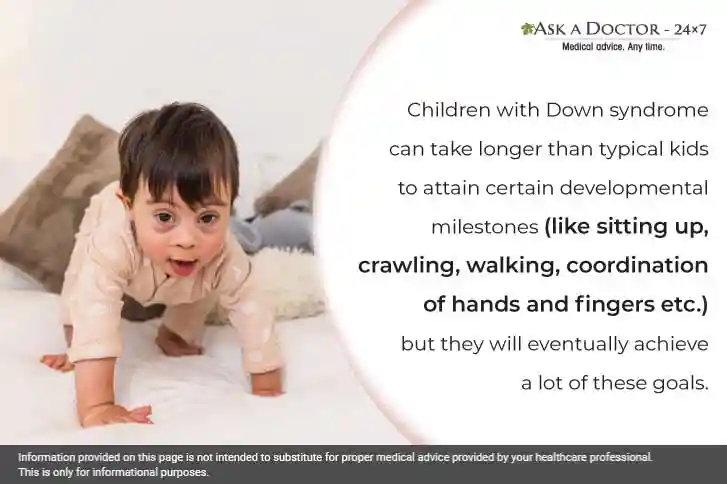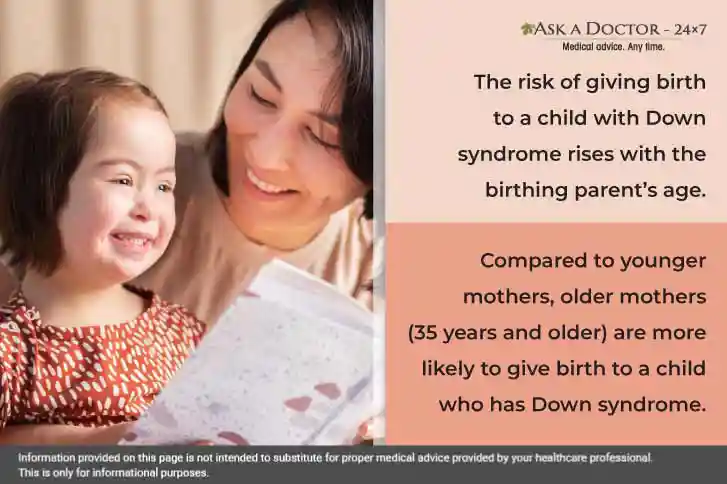Challenges And Joys Of Raising A Child With Down Syndrome: Watch Them Blossom And Prosper
Down syndrome is a genetic disorder characterized by the presence of an additional chromosome. Chromosomes are little "packages" of genes that control the development and growth of a baby's body during pregnancy and after birth. A newborn usually has 46 chromosomes. In Down syndrome, a baby is born with an extra copy of a chromosome (chromosome 21) i.e., as opposed to 46, these babies have 47 chromosomes in total. Due to this, the newborn may have difficulties with their mental and physical development, altering how their body and brain grow. Let’s understand this condition along with the challenges and joys of raising a kid with Down syndrome.
Understanding the Symptoms of Down syndrome

The range of symptoms associated with Down syndrome is diverse causing physical, cognitive, and behavioral symptoms. Not all children with Down syndrome have all these physical signs that vary with severity and are different from person to person, which include:
- Stunted growth or shorter than typical height
- Flat nose-bridge
- Eyes with a tilt that faces upward
- A short neck
- Little hands, feet, and ears
- Poor tone of muscles from birth
- A little pinky finger pointing in the direction of the thumb
- Single crease (palmar crease) in the hands
Besides the above, the other cognitive (problems with thinking and learning) and behavioral symptoms are:
Children with Down syndrome usually have an IQ (a measure of intelligence) a little lower on the testing scale than neurotypical children with delayed speech. Further, they also showcase:
- Poor decisiveness
- Short attention span
- Obsessive behavior
- Slow learning
- Delayed language and speech development
- Impulsivity and temper tantrums
Medical Concerns and Challenges Associated with Down syndrome

In addition to intellectual and developmental disabilities, children with Down syndrome are at increased risk for certain health problems. This can be stressful for parents who need to schedule routine check-ups with a pediatrician or other healthcare expert to help manage these medical conditions. In addition, they might need to pay for extra medical care for their child, such as surgery or prescription drugs adding to the financial burden.
Common medical issues associated with Down syndrome include:
- Hearing loss
- Infections of the ears
- Disorders of the eyes, such as cataracts
- Vision problems with patients needing glasses
- Obstructive sleep apnea is a disease where breathing stops momentarily while they are asleep.
- Congenital heart defect
- Birth-related intestinal obstruction sometimes necessitates surgery
- Dental problems
- Thyroid illness
- Anemia
Also, children with Down syndrome may face social stigma and prejudice, which can impact not only their self-esteem and social development but also add to the anxiety and guilt of their parents.
How to Raise a Child with Down syndrome?
Down syndrome is a lifelong condition. Early intervention services frequently aid infants and young children in developing their cognitive and motor skills. Your child with Down syndrome will probably visit multiple professionals to ensure their well-being. Their medical team could consist of:
- Primary care physicians administer immunizations and keep an eye on development, growth, and health issues.
- Medical professionals, such as cardiologists, Endocrinologists, geneticists, and hearing and sight specialists, depending on the patient's needs.
- Speech therapists to facilitate communication.
- Physical therapists to assist with muscle strengthening and motor skill improvement.
- Occupational therapists assist in improving their motor skills and simplifying daily duties.
- Behavioral therapists can assist in coping with the emotional difficulties associated with Down syndrome.
Tips to Raise a Child with Down syndrome
Let’s follow these tips for better care of the child:
- Establish a multilingual atmosphere. Don't be afraid to use sign language in communication, especially with children who are language-delayed. Label commonly used items in your home with large, colorful writing, and spend lots of time reading to and with your child.
- Divide the information into understandable and manageable bits. Make extensive use of visual curricula and materials, videos, and assistive devices to reinforce teaching.
- Use visual instructions wherever possible and make sure they are straightforward, easy to understand, and clear.
- Establish a routine for your child. Frequent repetitions or discussions of the task are comforting to the child as they fear deviations.
- Encourage your child’s physical fitness and involvement in all school activities, including extracurricular programs. You never know when they can grow up to become a renowned painter, singer, or dancer.
- Reinforce good behavior in your child by praising good conduct.
- Get a regular health checkup of your child. Some children might need hearing aids for partial hearing loss or reading glasses for vision defects.
- Get your child enrolled in early intervention support services like occupational, speech, and physical therapy to aid in developing motor and language skills.
When collaborating with physicians, therapists, and educators, keep your child's needs front and center rather than their illness.
Strengths of Raising a Child with Down Syndrome
While raising a kid with Down syndrome presents many difficulties, parents of these children also enjoy happiness that other parents would never know. They are incredibly proud of and in love with their kids.
Let’s see the strengths of raising a child with Down syndrome:
- Every day, kids and teenagers with Down syndrome do both extraordinary and commonplace feats. They are determined to achieve their goals and have aspirations and hopes for the future.
- Many children with Down syndrome have a distinct preference for visual learning methods and strong visual short-term memory.
- They are highly empathetic and love socializing. They love to take care of their pets.
- There is always a special bond between a mother and her child. It is amazing as a parent to see that with the right support, the progress children can make. Watching your child grow and develop is the biggest joy that outweighs the challenges faced.
When you first find out that your child has Down syndrome, you may experience a lot of despair, anxiety, and a feeling of anguish considering why this happened to your baby. These emotions are typical and normal, but sooner you as a parent with realize that children with Down syndrome are not so different from their contemporaries and they can accomplish everyday things independently if provided with adequate therapy support. As a parent, you need to recognize the special strengths and weaknesses of your child and aim to maximize your child's strengths and minimize the challenges that will affect their day-to-day life. It can also be beneficial to speak with other parents whose children have Down syndrome.
You should also consult your family doctor for counseling and a regular health checkup of your child. Always remember that with enough support and encouragement, children with Down syndrome can become independent and lead a fulfilling life.
If you have any questions about birth defects like Down syndrome, you can check with a Pediatrician and team of other specialists at Ask a doctor, 24x7.
Recently Answered Questions Related to Birth Defects and Child Mental Health
- Suggest Treatment For Down Syndrome
- What Does This Triple Marker Test Report Indicate?
- What Is The Life Span Of The Fetus With Edwards Syndrome?
- Can the High Risk Of Trisomy 21 During Pregnancy Be Treated With Medicines?
- What Causes High Heart Rate At 10 Weeks?
- What Does This Result From Down Syndrome Risk Screening Test Indicate?
Disclaimer: Information provided on this page is not intended to substitute for proper medical advice provided by your healthcare professional. This is only for informational purposes.
Ask a Specialist
Recent Questions


